Organisation Behaviour Report: Individual and Team Performance
VerifiedAdded on 2020/12/18
|16
|4796
|224
Report
AI Summary
This report delves into the multifaceted realm of organisational behaviour, examining its influence on individual and team performance within A David & Co. Ltd. It meticulously analyzes the impact of organisational culture, politics, and power dynamics on employee behaviour and productivity. The report explores various motivation theories, including Maslow's hierarchy of needs and Vroom's expectancy theory, assessing their applicability within the company. Furthermore, it contrasts the characteristics of effective and ineffective teams, providing insights into team dynamics and collaborative success. The report also investigates the concepts and philosophies of organisational behaviour, offering practical solutions to challenges related to workplace culture and politics. Overall, the report aims to provide a comprehensive understanding of organisational behaviour and its implications for fostering a productive and positive work environment.
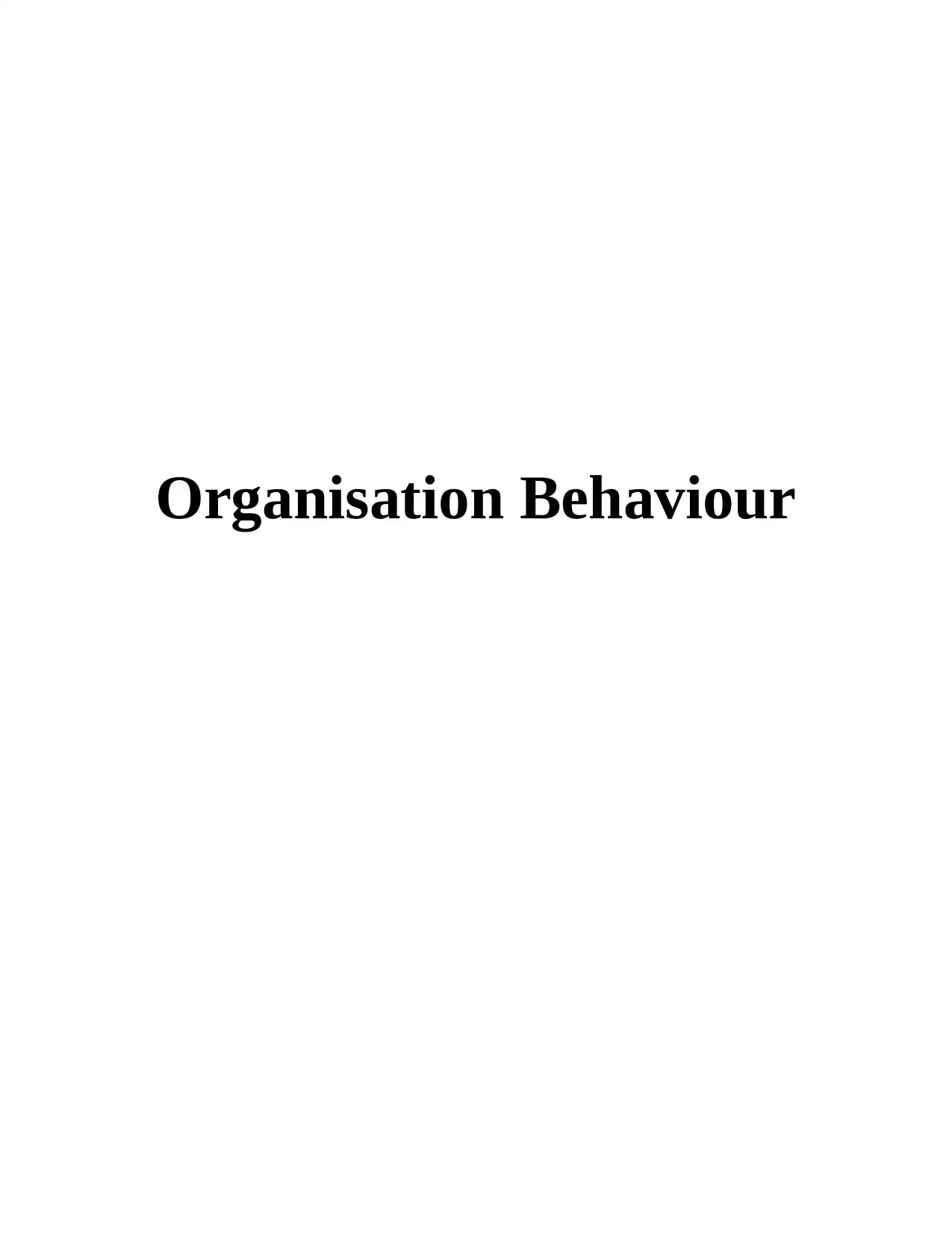
Organisation Behaviour
Paraphrase This Document
Need a fresh take? Get an instant paraphrase of this document with our AI Paraphraser
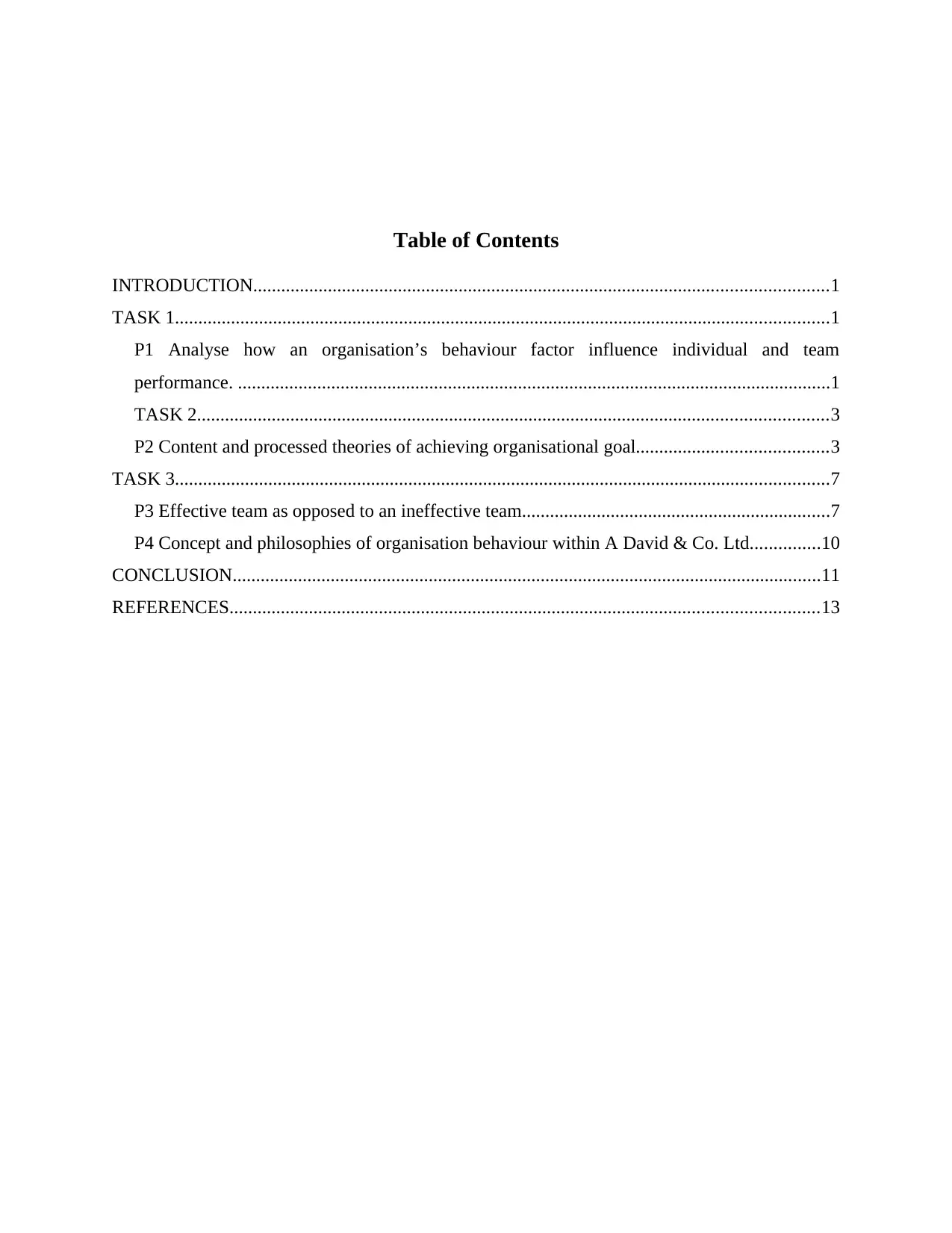
Table of Contents
INTRODUCTION...........................................................................................................................1
TASK 1............................................................................................................................................1
P1 Analyse how an organisation’s behaviour factor influence individual and team
performance. ...............................................................................................................................1
TASK 2.......................................................................................................................................3
P2 Content and processed theories of achieving organisational goal.........................................3
TASK 3............................................................................................................................................7
P3 Effective team as opposed to an ineffective team..................................................................7
P4 Concept and philosophies of organisation behaviour within A David & Co. Ltd...............10
CONCLUSION..............................................................................................................................11
REFERENCES..............................................................................................................................13
INTRODUCTION...........................................................................................................................1
TASK 1............................................................................................................................................1
P1 Analyse how an organisation’s behaviour factor influence individual and team
performance. ...............................................................................................................................1
TASK 2.......................................................................................................................................3
P2 Content and processed theories of achieving organisational goal.........................................3
TASK 3............................................................................................................................................7
P3 Effective team as opposed to an ineffective team..................................................................7
P4 Concept and philosophies of organisation behaviour within A David & Co. Ltd...............10
CONCLUSION..............................................................................................................................11
REFERENCES..............................................................................................................................13
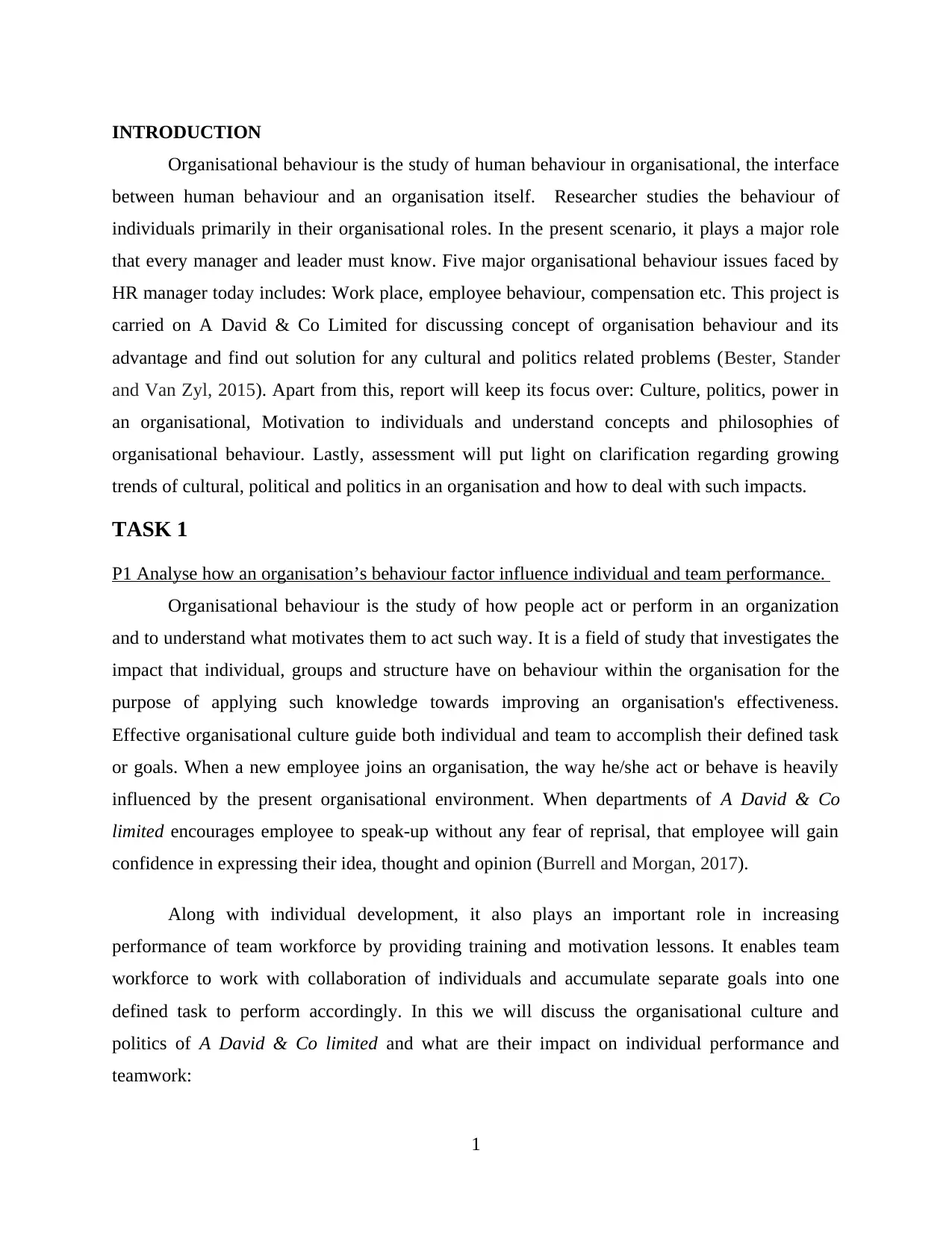
INTRODUCTION
Organisational behaviour is the study of human behaviour in organisational, the interface
between human behaviour and an organisation itself. Researcher studies the behaviour of
individuals primarily in their organisational roles. In the present scenario, it plays a major role
that every manager and leader must know. Five major organisational behaviour issues faced by
HR manager today includes: Work place, employee behaviour, compensation etc. This project is
carried on A David & Co Limited for discussing concept of organisation behaviour and its
advantage and find out solution for any cultural and politics related problems (Bester, Stander
and Van Zyl, 2015). Apart from this, report will keep its focus over: Culture, politics, power in
an organisational, Motivation to individuals and understand concepts and philosophies of
organisational behaviour. Lastly, assessment will put light on clarification regarding growing
trends of cultural, political and politics in an organisation and how to deal with such impacts.
TASK 1
P1 Analyse how an organisation’s behaviour factor influence individual and team performance.
Organisational behaviour is the study of how people act or perform in an organization
and to understand what motivates them to act such way. It is a field of study that investigates the
impact that individual, groups and structure have on behaviour within the organisation for the
purpose of applying such knowledge towards improving an organisation's effectiveness.
Effective organisational culture guide both individual and team to accomplish their defined task
or goals. When a new employee joins an organisation, the way he/she act or behave is heavily
influenced by the present organisational environment. When departments of A David & Co
limited encourages employee to speak-up without any fear of reprisal, that employee will gain
confidence in expressing their idea, thought and opinion (Burrell and Morgan, 2017).
Along with individual development, it also plays an important role in increasing
performance of team workforce by providing training and motivation lessons. It enables team
workforce to work with collaboration of individuals and accumulate separate goals into one
defined task to perform accordingly. In this we will discuss the organisational culture and
politics of A David & Co limited and what are their impact on individual performance and
teamwork:
1
Organisational behaviour is the study of human behaviour in organisational, the interface
between human behaviour and an organisation itself. Researcher studies the behaviour of
individuals primarily in their organisational roles. In the present scenario, it plays a major role
that every manager and leader must know. Five major organisational behaviour issues faced by
HR manager today includes: Work place, employee behaviour, compensation etc. This project is
carried on A David & Co Limited for discussing concept of organisation behaviour and its
advantage and find out solution for any cultural and politics related problems (Bester, Stander
and Van Zyl, 2015). Apart from this, report will keep its focus over: Culture, politics, power in
an organisational, Motivation to individuals and understand concepts and philosophies of
organisational behaviour. Lastly, assessment will put light on clarification regarding growing
trends of cultural, political and politics in an organisation and how to deal with such impacts.
TASK 1
P1 Analyse how an organisation’s behaviour factor influence individual and team performance.
Organisational behaviour is the study of how people act or perform in an organization
and to understand what motivates them to act such way. It is a field of study that investigates the
impact that individual, groups and structure have on behaviour within the organisation for the
purpose of applying such knowledge towards improving an organisation's effectiveness.
Effective organisational culture guide both individual and team to accomplish their defined task
or goals. When a new employee joins an organisation, the way he/she act or behave is heavily
influenced by the present organisational environment. When departments of A David & Co
limited encourages employee to speak-up without any fear of reprisal, that employee will gain
confidence in expressing their idea, thought and opinion (Burrell and Morgan, 2017).
Along with individual development, it also plays an important role in increasing
performance of team workforce by providing training and motivation lessons. It enables team
workforce to work with collaboration of individuals and accumulate separate goals into one
defined task to perform accordingly. In this we will discuss the organisational culture and
politics of A David & Co limited and what are their impact on individual performance and
teamwork:
1
⊘ This is a preview!⊘
Do you want full access?
Subscribe today to unlock all pages.

Trusted by 1+ million students worldwide
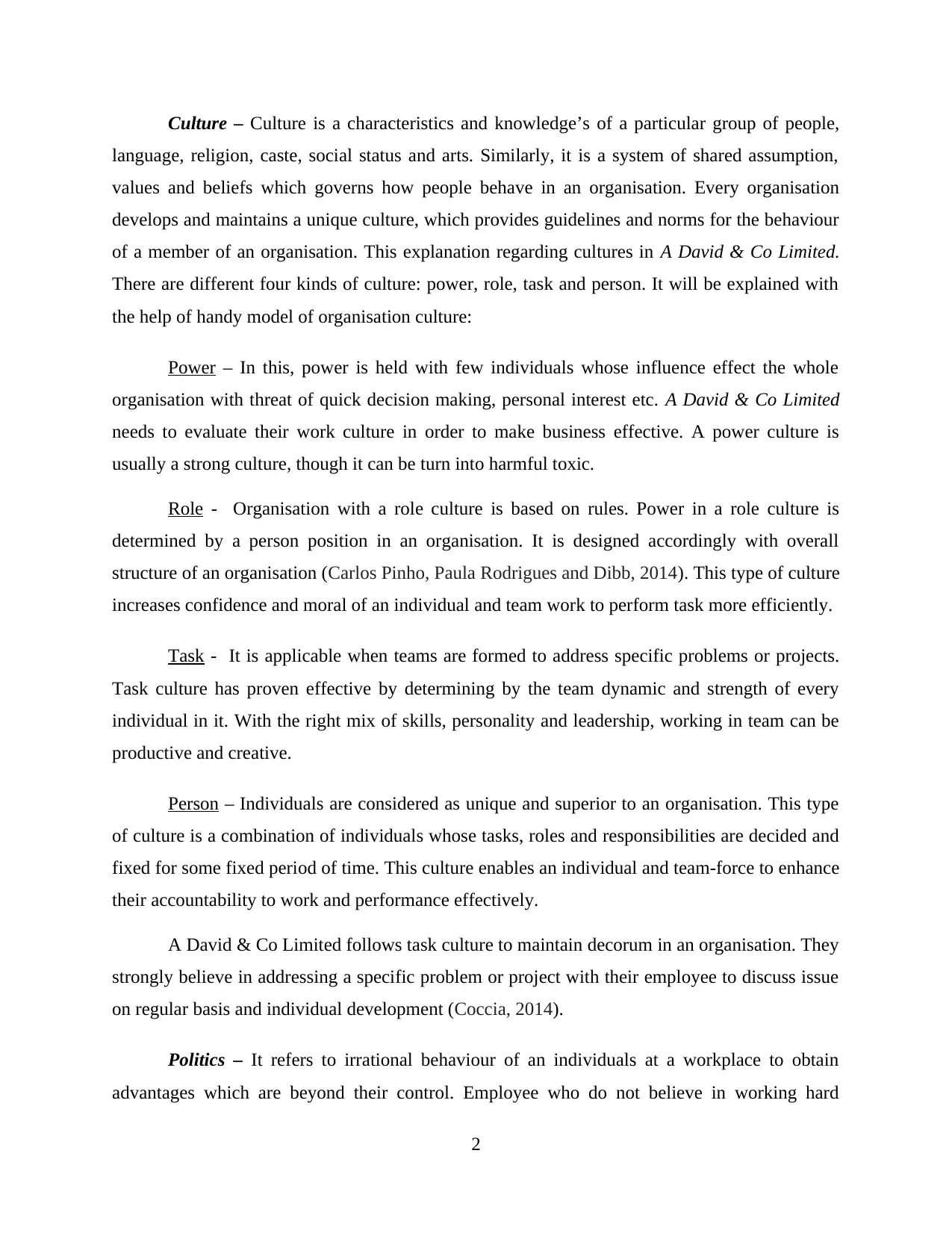
Culture – Culture is a characteristics and knowledge’s of a particular group of people,
language, religion, caste, social status and arts. Similarly, it is a system of shared assumption,
values and beliefs which governs how people behave in an organisation. Every organisation
develops and maintains a unique culture, which provides guidelines and norms for the behaviour
of a member of an organisation. This explanation regarding cultures in A David & Co Limited.
There are different four kinds of culture: power, role, task and person. It will be explained with
the help of handy model of organisation culture:
Power – In this, power is held with few individuals whose influence effect the whole
organisation with threat of quick decision making, personal interest etc. A David & Co Limited
needs to evaluate their work culture in order to make business effective. A power culture is
usually a strong culture, though it can be turn into harmful toxic.
Role - Organisation with a role culture is based on rules. Power in a role culture is
determined by a person position in an organisation. It is designed accordingly with overall
structure of an organisation (Carlos Pinho, Paula Rodrigues and Dibb, 2014). This type of culture
increases confidence and moral of an individual and team work to perform task more efficiently.
Task - It is applicable when teams are formed to address specific problems or projects.
Task culture has proven effective by determining by the team dynamic and strength of every
individual in it. With the right mix of skills, personality and leadership, working in team can be
productive and creative.
Person – Individuals are considered as unique and superior to an organisation. This type
of culture is a combination of individuals whose tasks, roles and responsibilities are decided and
fixed for some fixed period of time. This culture enables an individual and team-force to enhance
their accountability to work and performance effectively.
A David & Co Limited follows task culture to maintain decorum in an organisation. They
strongly believe in addressing a specific problem or project with their employee to discuss issue
on regular basis and individual development (Coccia, 2014).
Politics – It refers to irrational behaviour of an individuals at a workplace to obtain
advantages which are beyond their control. Employee who do not believe in working hard
2
language, religion, caste, social status and arts. Similarly, it is a system of shared assumption,
values and beliefs which governs how people behave in an organisation. Every organisation
develops and maintains a unique culture, which provides guidelines and norms for the behaviour
of a member of an organisation. This explanation regarding cultures in A David & Co Limited.
There are different four kinds of culture: power, role, task and person. It will be explained with
the help of handy model of organisation culture:
Power – In this, power is held with few individuals whose influence effect the whole
organisation with threat of quick decision making, personal interest etc. A David & Co Limited
needs to evaluate their work culture in order to make business effective. A power culture is
usually a strong culture, though it can be turn into harmful toxic.
Role - Organisation with a role culture is based on rules. Power in a role culture is
determined by a person position in an organisation. It is designed accordingly with overall
structure of an organisation (Carlos Pinho, Paula Rodrigues and Dibb, 2014). This type of culture
increases confidence and moral of an individual and team work to perform task more efficiently.
Task - It is applicable when teams are formed to address specific problems or projects.
Task culture has proven effective by determining by the team dynamic and strength of every
individual in it. With the right mix of skills, personality and leadership, working in team can be
productive and creative.
Person – Individuals are considered as unique and superior to an organisation. This type
of culture is a combination of individuals whose tasks, roles and responsibilities are decided and
fixed for some fixed period of time. This culture enables an individual and team-force to enhance
their accountability to work and performance effectively.
A David & Co Limited follows task culture to maintain decorum in an organisation. They
strongly believe in addressing a specific problem or project with their employee to discuss issue
on regular basis and individual development (Coccia, 2014).
Politics – It refers to irrational behaviour of an individuals at a workplace to obtain
advantages which are beyond their control. Employee who do not believe in working hard
2
Paraphrase This Document
Need a fresh take? Get an instant paraphrase of this document with our AI Paraphraser
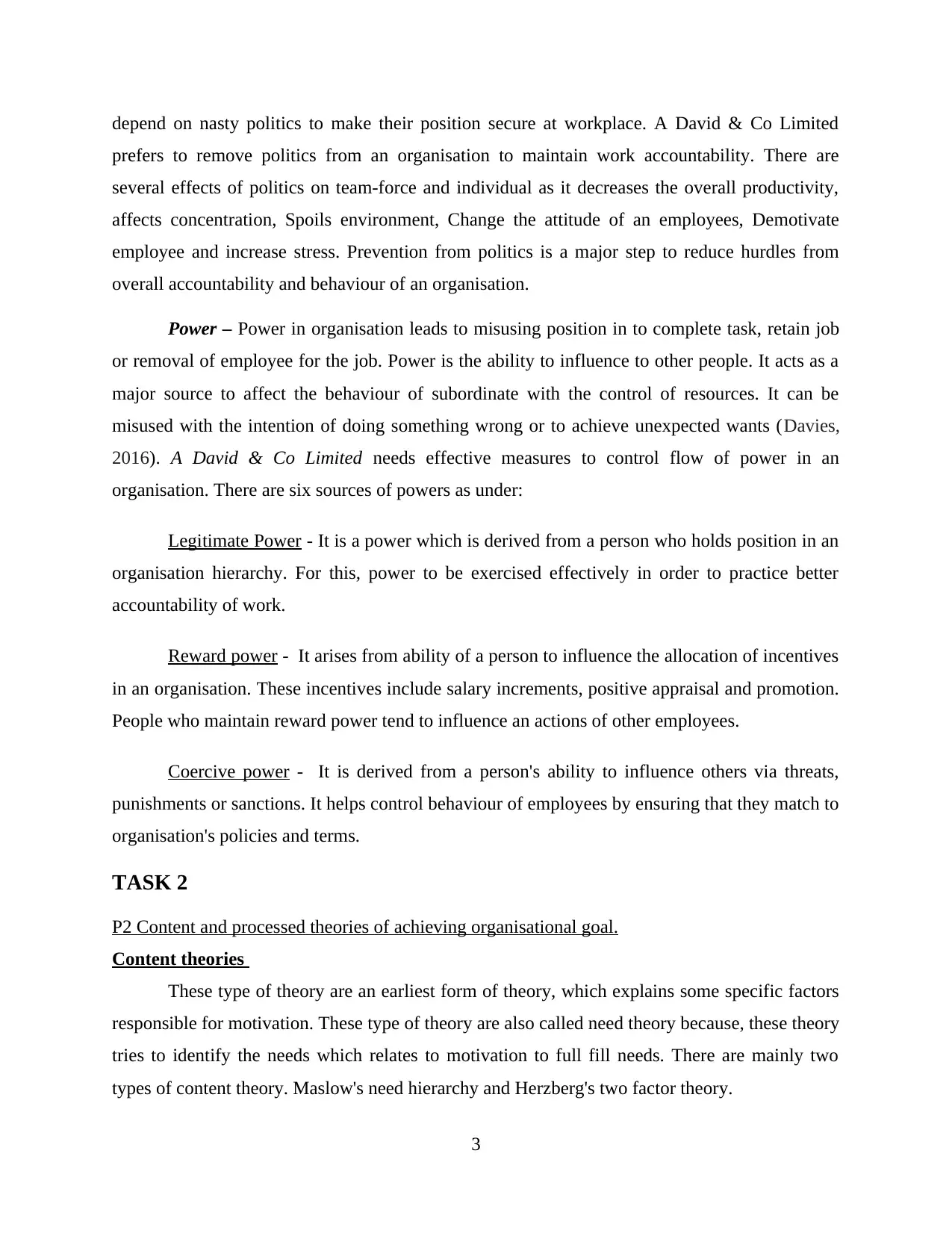
depend on nasty politics to make their position secure at workplace. A David & Co Limited
prefers to remove politics from an organisation to maintain work accountability. There are
several effects of politics on team-force and individual as it decreases the overall productivity,
affects concentration, Spoils environment, Change the attitude of an employees, Demotivate
employee and increase stress. Prevention from politics is a major step to reduce hurdles from
overall accountability and behaviour of an organisation.
Power – Power in organisation leads to misusing position in to complete task, retain job
or removal of employee for the job. Power is the ability to influence to other people. It acts as a
major source to affect the behaviour of subordinate with the control of resources. It can be
misused with the intention of doing something wrong or to achieve unexpected wants (Davies,
2016). A David & Co Limited needs effective measures to control flow of power in an
organisation. There are six sources of powers as under:
Legitimate Power - It is a power which is derived from a person who holds position in an
organisation hierarchy. For this, power to be exercised effectively in order to practice better
accountability of work.
Reward power - It arises from ability of a person to influence the allocation of incentives
in an organisation. These incentives include salary increments, positive appraisal and promotion.
People who maintain reward power tend to influence an actions of other employees.
Coercive power - It is derived from a person's ability to influence others via threats,
punishments or sanctions. It helps control behaviour of employees by ensuring that they match to
organisation's policies and terms.
TASK 2
P2 Content and processed theories of achieving organisational goal.
Content theories
These type of theory are an earliest form of theory, which explains some specific factors
responsible for motivation. These type of theory are also called need theory because, these theory
tries to identify the needs which relates to motivation to full fill needs. There are mainly two
types of content theory. Maslow's need hierarchy and Herzberg's two factor theory.
3
prefers to remove politics from an organisation to maintain work accountability. There are
several effects of politics on team-force and individual as it decreases the overall productivity,
affects concentration, Spoils environment, Change the attitude of an employees, Demotivate
employee and increase stress. Prevention from politics is a major step to reduce hurdles from
overall accountability and behaviour of an organisation.
Power – Power in organisation leads to misusing position in to complete task, retain job
or removal of employee for the job. Power is the ability to influence to other people. It acts as a
major source to affect the behaviour of subordinate with the control of resources. It can be
misused with the intention of doing something wrong or to achieve unexpected wants (Davies,
2016). A David & Co Limited needs effective measures to control flow of power in an
organisation. There are six sources of powers as under:
Legitimate Power - It is a power which is derived from a person who holds position in an
organisation hierarchy. For this, power to be exercised effectively in order to practice better
accountability of work.
Reward power - It arises from ability of a person to influence the allocation of incentives
in an organisation. These incentives include salary increments, positive appraisal and promotion.
People who maintain reward power tend to influence an actions of other employees.
Coercive power - It is derived from a person's ability to influence others via threats,
punishments or sanctions. It helps control behaviour of employees by ensuring that they match to
organisation's policies and terms.
TASK 2
P2 Content and processed theories of achieving organisational goal.
Content theories
These type of theory are an earliest form of theory, which explains some specific factors
responsible for motivation. These type of theory are also called need theory because, these theory
tries to identify the needs which relates to motivation to full fill needs. There are mainly two
types of content theory. Maslow's need hierarchy and Herzberg's two factor theory.
3
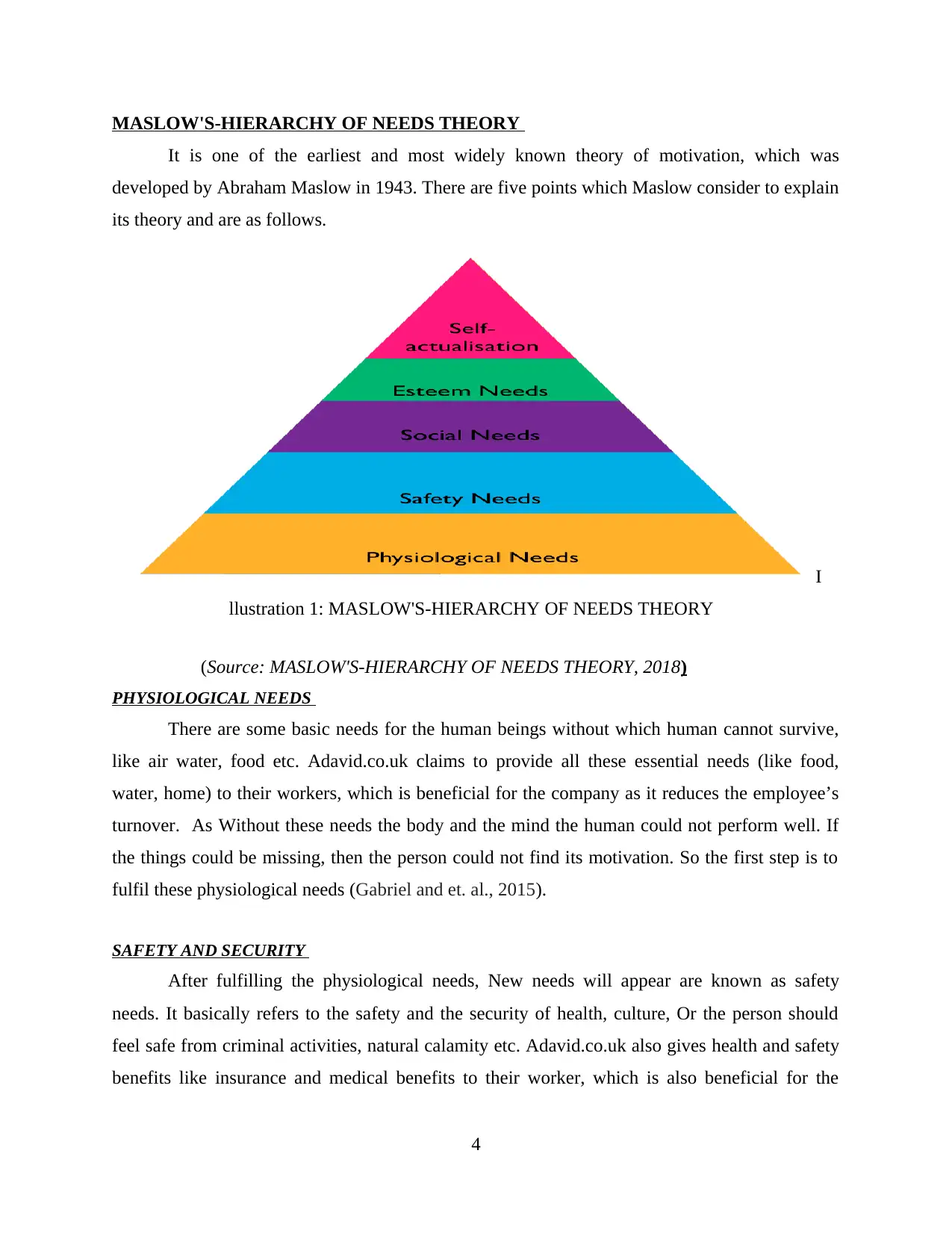
MASLOW'S-HIERARCHY OF NEEDS THEORY
It is one of the earliest and most widely known theory of motivation, which was
developed by Abraham Maslow in 1943. There are five points which Maslow consider to explain
its theory and are as follows.
(Source: MASLOW'S-HIERARCHY OF NEEDS THEORY, 2018)
PHYSIOLOGICAL NEEDS
There are some basic needs for the human beings without which human cannot survive,
like air water, food etc. Adavid.co.uk claims to provide all these essential needs (like food,
water, home) to their workers, which is beneficial for the company as it reduces the employee’s
turnover. As Without these needs the body and the mind the human could not perform well. If
the things could be missing, then the person could not find its motivation. So the first step is to
fulfil these physiological needs (Gabriel and et. al., 2015).
SAFETY AND SECURITY
After fulfilling the physiological needs, New needs will appear are known as safety
needs. It basically refers to the safety and the security of health, culture, Or the person should
feel safe from criminal activities, natural calamity etc. Adavid.co.uk also gives health and safety
benefits like insurance and medical benefits to their worker, which is also beneficial for the
4
I
llustration 1: MASLOW'S-HIERARCHY OF NEEDS THEORY
It is one of the earliest and most widely known theory of motivation, which was
developed by Abraham Maslow in 1943. There are five points which Maslow consider to explain
its theory and are as follows.
(Source: MASLOW'S-HIERARCHY OF NEEDS THEORY, 2018)
PHYSIOLOGICAL NEEDS
There are some basic needs for the human beings without which human cannot survive,
like air water, food etc. Adavid.co.uk claims to provide all these essential needs (like food,
water, home) to their workers, which is beneficial for the company as it reduces the employee’s
turnover. As Without these needs the body and the mind the human could not perform well. If
the things could be missing, then the person could not find its motivation. So the first step is to
fulfil these physiological needs (Gabriel and et. al., 2015).
SAFETY AND SECURITY
After fulfilling the physiological needs, New needs will appear are known as safety
needs. It basically refers to the safety and the security of health, culture, Or the person should
feel safe from criminal activities, natural calamity etc. Adavid.co.uk also gives health and safety
benefits like insurance and medical benefits to their worker, which is also beneficial for the
4
I
llustration 1: MASLOW'S-HIERARCHY OF NEEDS THEORY
⊘ This is a preview!⊘
Do you want full access?
Subscribe today to unlock all pages.

Trusted by 1+ million students worldwide
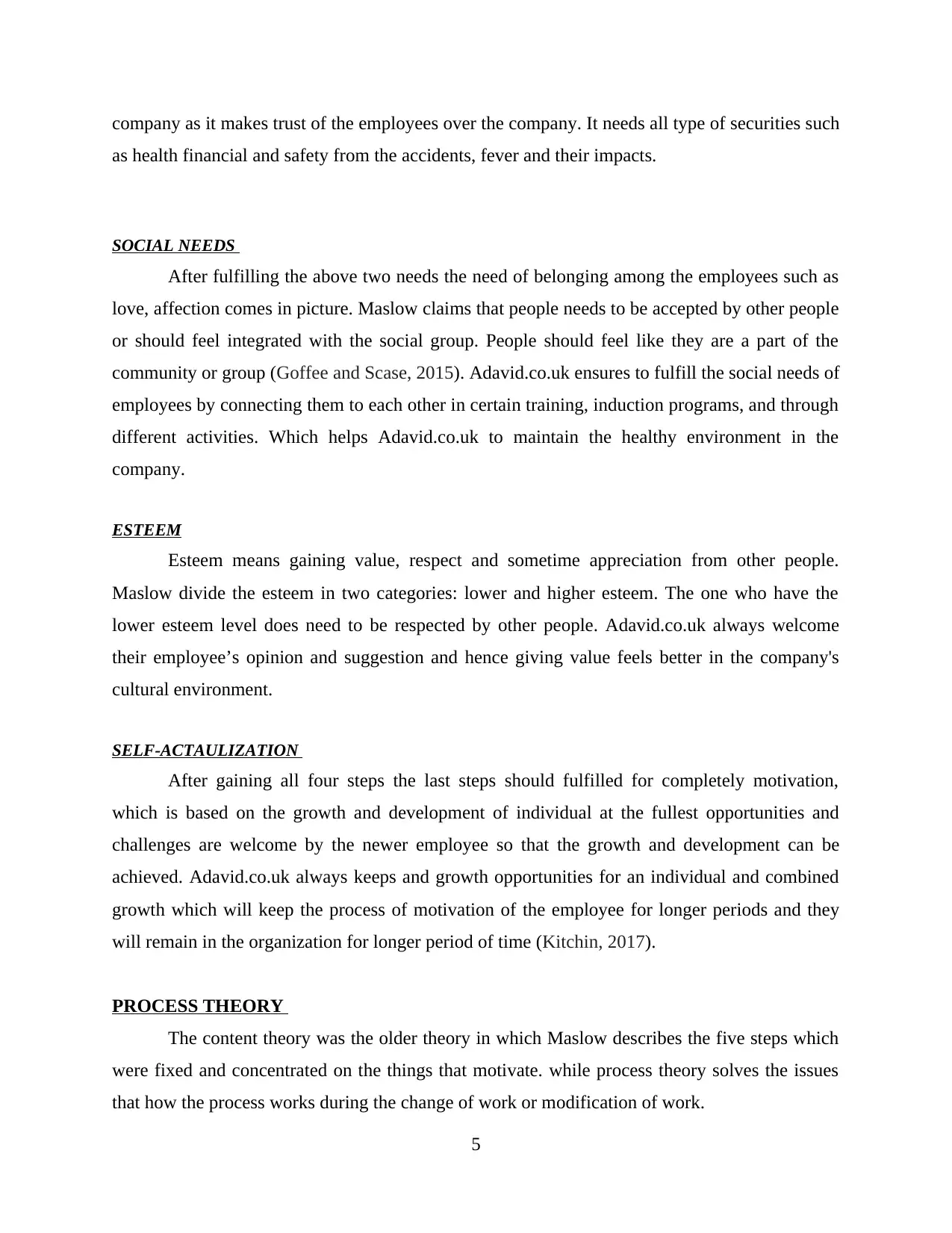
company as it makes trust of the employees over the company. It needs all type of securities such
as health financial and safety from the accidents, fever and their impacts.
SOCIAL NEEDS
After fulfilling the above two needs the need of belonging among the employees such as
love, affection comes in picture. Maslow claims that people needs to be accepted by other people
or should feel integrated with the social group. People should feel like they are a part of the
community or group (Goffee and Scase, 2015). Adavid.co.uk ensures to fulfill the social needs of
employees by connecting them to each other in certain training, induction programs, and through
different activities. Which helps Adavid.co.uk to maintain the healthy environment in the
company.
ESTEEM
Esteem means gaining value, respect and sometime appreciation from other people.
Maslow divide the esteem in two categories: lower and higher esteem. The one who have the
lower esteem level does need to be respected by other people. Adavid.co.uk always welcome
their employee’s opinion and suggestion and hence giving value feels better in the company's
cultural environment.
SELF-ACTAULIZATION
After gaining all four steps the last steps should fulfilled for completely motivation,
which is based on the growth and development of individual at the fullest opportunities and
challenges are welcome by the newer employee so that the growth and development can be
achieved. Adavid.co.uk always keeps and growth opportunities for an individual and combined
growth which will keep the process of motivation of the employee for longer periods and they
will remain in the organization for longer period of time (Kitchin, 2017).
PROCESS THEORY
The content theory was the older theory in which Maslow describes the five steps which
were fixed and concentrated on the things that motivate. while process theory solves the issues
that how the process works during the change of work or modification of work.
5
as health financial and safety from the accidents, fever and their impacts.
SOCIAL NEEDS
After fulfilling the above two needs the need of belonging among the employees such as
love, affection comes in picture. Maslow claims that people needs to be accepted by other people
or should feel integrated with the social group. People should feel like they are a part of the
community or group (Goffee and Scase, 2015). Adavid.co.uk ensures to fulfill the social needs of
employees by connecting them to each other in certain training, induction programs, and through
different activities. Which helps Adavid.co.uk to maintain the healthy environment in the
company.
ESTEEM
Esteem means gaining value, respect and sometime appreciation from other people.
Maslow divide the esteem in two categories: lower and higher esteem. The one who have the
lower esteem level does need to be respected by other people. Adavid.co.uk always welcome
their employee’s opinion and suggestion and hence giving value feels better in the company's
cultural environment.
SELF-ACTAULIZATION
After gaining all four steps the last steps should fulfilled for completely motivation,
which is based on the growth and development of individual at the fullest opportunities and
challenges are welcome by the newer employee so that the growth and development can be
achieved. Adavid.co.uk always keeps and growth opportunities for an individual and combined
growth which will keep the process of motivation of the employee for longer periods and they
will remain in the organization for longer period of time (Kitchin, 2017).
PROCESS THEORY
The content theory was the older theory in which Maslow describes the five steps which
were fixed and concentrated on the things that motivate. while process theory solves the issues
that how the process works during the change of work or modification of work.
5
Paraphrase This Document
Need a fresh take? Get an instant paraphrase of this document with our AI Paraphraser
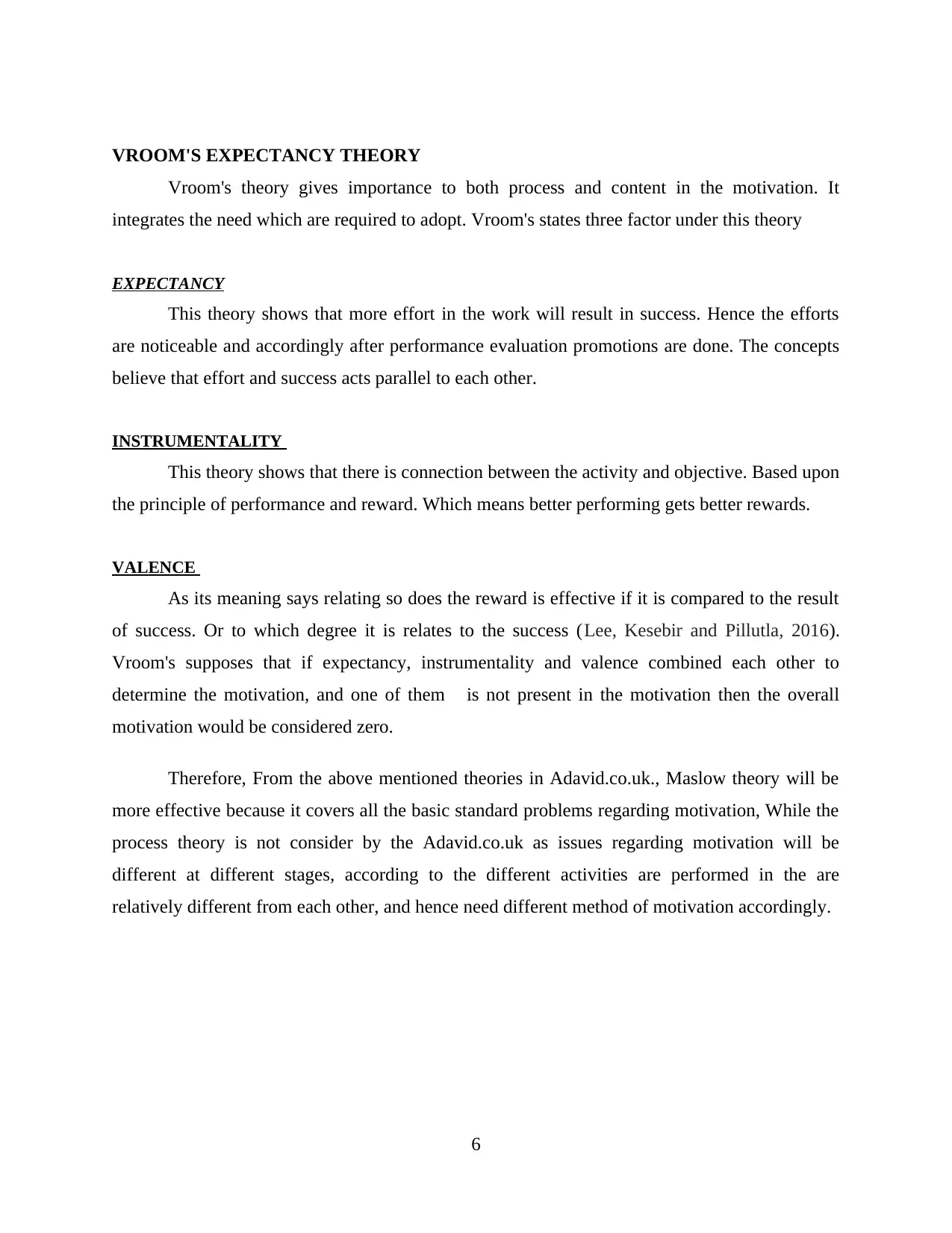
VROOM'S EXPECTANCY THEORY
Vroom's theory gives importance to both process and content in the motivation. It
integrates the need which are required to adopt. Vroom's states three factor under this theory
EXPECTANCY
This theory shows that more effort in the work will result in success. Hence the efforts
are noticeable and accordingly after performance evaluation promotions are done. The concepts
believe that effort and success acts parallel to each other.
INSTRUMENTALITY
This theory shows that there is connection between the activity and objective. Based upon
the principle of performance and reward. Which means better performing gets better rewards.
VALENCE
As its meaning says relating so does the reward is effective if it is compared to the result
of success. Or to which degree it is relates to the success (Lee, Kesebir and Pillutla, 2016).
Vroom's supposes that if expectancy, instrumentality and valence combined each other to
determine the motivation, and one of them is not present in the motivation then the overall
motivation would be considered zero.
Therefore, From the above mentioned theories in Adavid.co.uk., Maslow theory will be
more effective because it covers all the basic standard problems regarding motivation, While the
process theory is not consider by the Adavid.co.uk as issues regarding motivation will be
different at different stages, according to the different activities are performed in the are
relatively different from each other, and hence need different method of motivation accordingly.
6
Vroom's theory gives importance to both process and content in the motivation. It
integrates the need which are required to adopt. Vroom's states three factor under this theory
EXPECTANCY
This theory shows that more effort in the work will result in success. Hence the efforts
are noticeable and accordingly after performance evaluation promotions are done. The concepts
believe that effort and success acts parallel to each other.
INSTRUMENTALITY
This theory shows that there is connection between the activity and objective. Based upon
the principle of performance and reward. Which means better performing gets better rewards.
VALENCE
As its meaning says relating so does the reward is effective if it is compared to the result
of success. Or to which degree it is relates to the success (Lee, Kesebir and Pillutla, 2016).
Vroom's supposes that if expectancy, instrumentality and valence combined each other to
determine the motivation, and one of them is not present in the motivation then the overall
motivation would be considered zero.
Therefore, From the above mentioned theories in Adavid.co.uk., Maslow theory will be
more effective because it covers all the basic standard problems regarding motivation, While the
process theory is not consider by the Adavid.co.uk as issues regarding motivation will be
different at different stages, according to the different activities are performed in the are
relatively different from each other, and hence need different method of motivation accordingly.
6
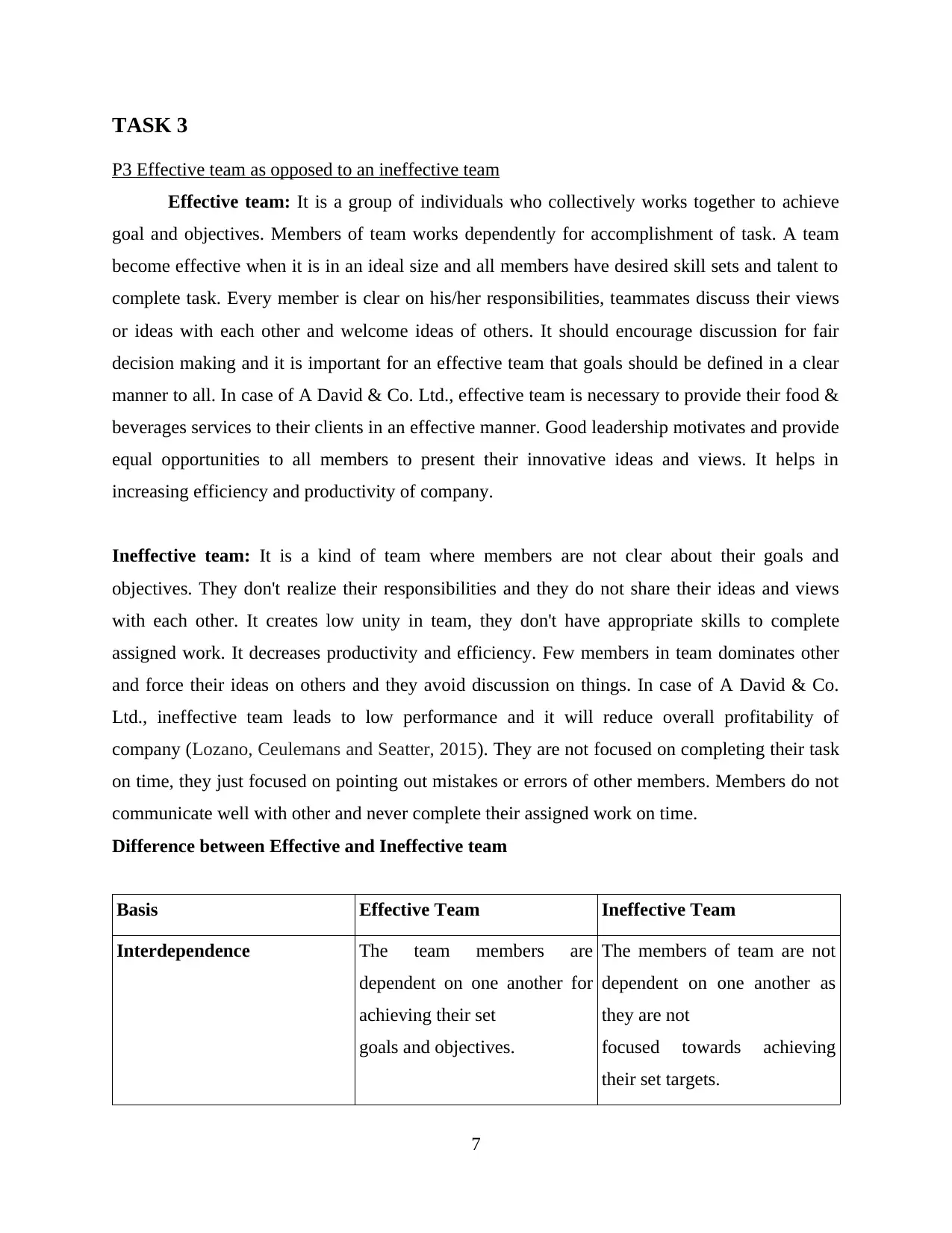
TASK 3
P3 Effective team as opposed to an ineffective team
Effective team: It is a group of individuals who collectively works together to achieve
goal and objectives. Members of team works dependently for accomplishment of task. A team
become effective when it is in an ideal size and all members have desired skill sets and talent to
complete task. Every member is clear on his/her responsibilities, teammates discuss their views
or ideas with each other and welcome ideas of others. It should encourage discussion for fair
decision making and it is important for an effective team that goals should be defined in a clear
manner to all. In case of A David & Co. Ltd., effective team is necessary to provide their food &
beverages services to their clients in an effective manner. Good leadership motivates and provide
equal opportunities to all members to present their innovative ideas and views. It helps in
increasing efficiency and productivity of company.
Ineffective team: It is a kind of team where members are not clear about their goals and
objectives. They don't realize their responsibilities and they do not share their ideas and views
with each other. It creates low unity in team, they don't have appropriate skills to complete
assigned work. It decreases productivity and efficiency. Few members in team dominates other
and force their ideas on others and they avoid discussion on things. In case of A David & Co.
Ltd., ineffective team leads to low performance and it will reduce overall profitability of
company (Lozano, Ceulemans and Seatter, 2015). They are not focused on completing their task
on time, they just focused on pointing out mistakes or errors of other members. Members do not
communicate well with other and never complete their assigned work on time.
Difference between Effective and Ineffective team
Basis Effective Team Ineffective Team
Interdependence The team members are
dependent on one another for
achieving their set
goals and objectives.
The members of team are not
dependent on one another as
they are not
focused towards achieving
their set targets.
7
P3 Effective team as opposed to an ineffective team
Effective team: It is a group of individuals who collectively works together to achieve
goal and objectives. Members of team works dependently for accomplishment of task. A team
become effective when it is in an ideal size and all members have desired skill sets and talent to
complete task. Every member is clear on his/her responsibilities, teammates discuss their views
or ideas with each other and welcome ideas of others. It should encourage discussion for fair
decision making and it is important for an effective team that goals should be defined in a clear
manner to all. In case of A David & Co. Ltd., effective team is necessary to provide their food &
beverages services to their clients in an effective manner. Good leadership motivates and provide
equal opportunities to all members to present their innovative ideas and views. It helps in
increasing efficiency and productivity of company.
Ineffective team: It is a kind of team where members are not clear about their goals and
objectives. They don't realize their responsibilities and they do not share their ideas and views
with each other. It creates low unity in team, they don't have appropriate skills to complete
assigned work. It decreases productivity and efficiency. Few members in team dominates other
and force their ideas on others and they avoid discussion on things. In case of A David & Co.
Ltd., ineffective team leads to low performance and it will reduce overall profitability of
company (Lozano, Ceulemans and Seatter, 2015). They are not focused on completing their task
on time, they just focused on pointing out mistakes or errors of other members. Members do not
communicate well with other and never complete their assigned work on time.
Difference between Effective and Ineffective team
Basis Effective Team Ineffective Team
Interdependence The team members are
dependent on one another for
achieving their set
goals and objectives.
The members of team are not
dependent on one another as
they are not
focused towards achieving
their set targets.
7
⊘ This is a preview!⊘
Do you want full access?
Subscribe today to unlock all pages.

Trusted by 1+ million students worldwide
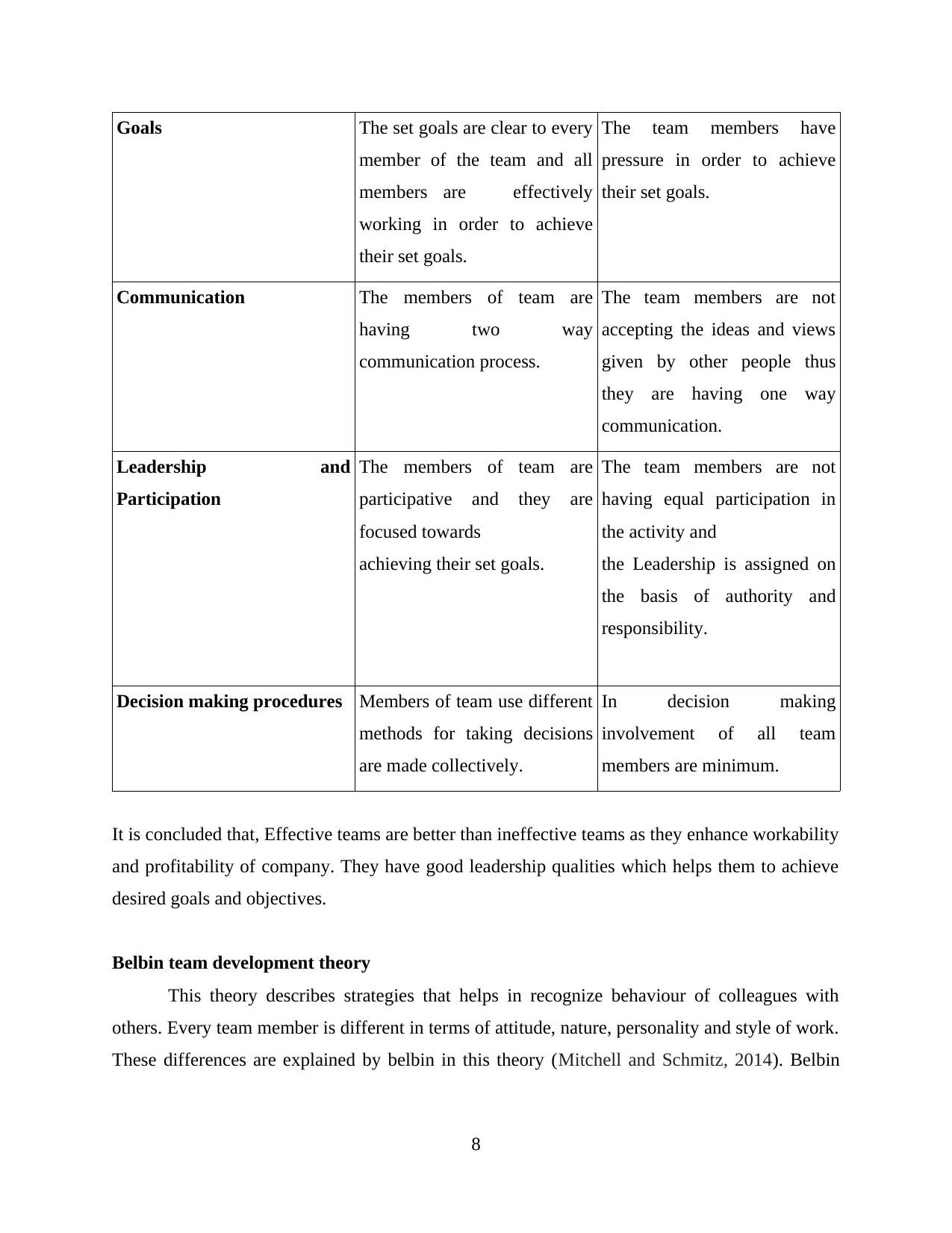
Goals The set goals are clear to every
member of the team and all
members are effectively
working in order to achieve
their set goals.
The team members have
pressure in order to achieve
their set goals.
Communication The members of team are
having two way
communication process.
The team members are not
accepting the ideas and views
given by other people thus
they are having one way
communication.
Leadership and
Participation
The members of team are
participative and they are
focused towards
achieving their set goals.
The team members are not
having equal participation in
the activity and
the Leadership is assigned on
the basis of authority and
responsibility.
Decision making procedures Members of team use different
methods for taking decisions
are made collectively.
In decision making
involvement of all team
members are minimum.
It is concluded that, Effective teams are better than ineffective teams as they enhance workability
and profitability of company. They have good leadership qualities which helps them to achieve
desired goals and objectives.
Belbin team development theory
This theory describes strategies that helps in recognize behaviour of colleagues with
others. Every team member is different in terms of attitude, nature, personality and style of work.
These differences are explained by belbin in this theory (Mitchell and Schmitz, 2014). Belbin
8
member of the team and all
members are effectively
working in order to achieve
their set goals.
The team members have
pressure in order to achieve
their set goals.
Communication The members of team are
having two way
communication process.
The team members are not
accepting the ideas and views
given by other people thus
they are having one way
communication.
Leadership and
Participation
The members of team are
participative and they are
focused towards
achieving their set goals.
The team members are not
having equal participation in
the activity and
the Leadership is assigned on
the basis of authority and
responsibility.
Decision making procedures Members of team use different
methods for taking decisions
are made collectively.
In decision making
involvement of all team
members are minimum.
It is concluded that, Effective teams are better than ineffective teams as they enhance workability
and profitability of company. They have good leadership qualities which helps them to achieve
desired goals and objectives.
Belbin team development theory
This theory describes strategies that helps in recognize behaviour of colleagues with
others. Every team member is different in terms of attitude, nature, personality and style of work.
These differences are explained by belbin in this theory (Mitchell and Schmitz, 2014). Belbin
8
Paraphrase This Document
Need a fresh take? Get an instant paraphrase of this document with our AI Paraphraser
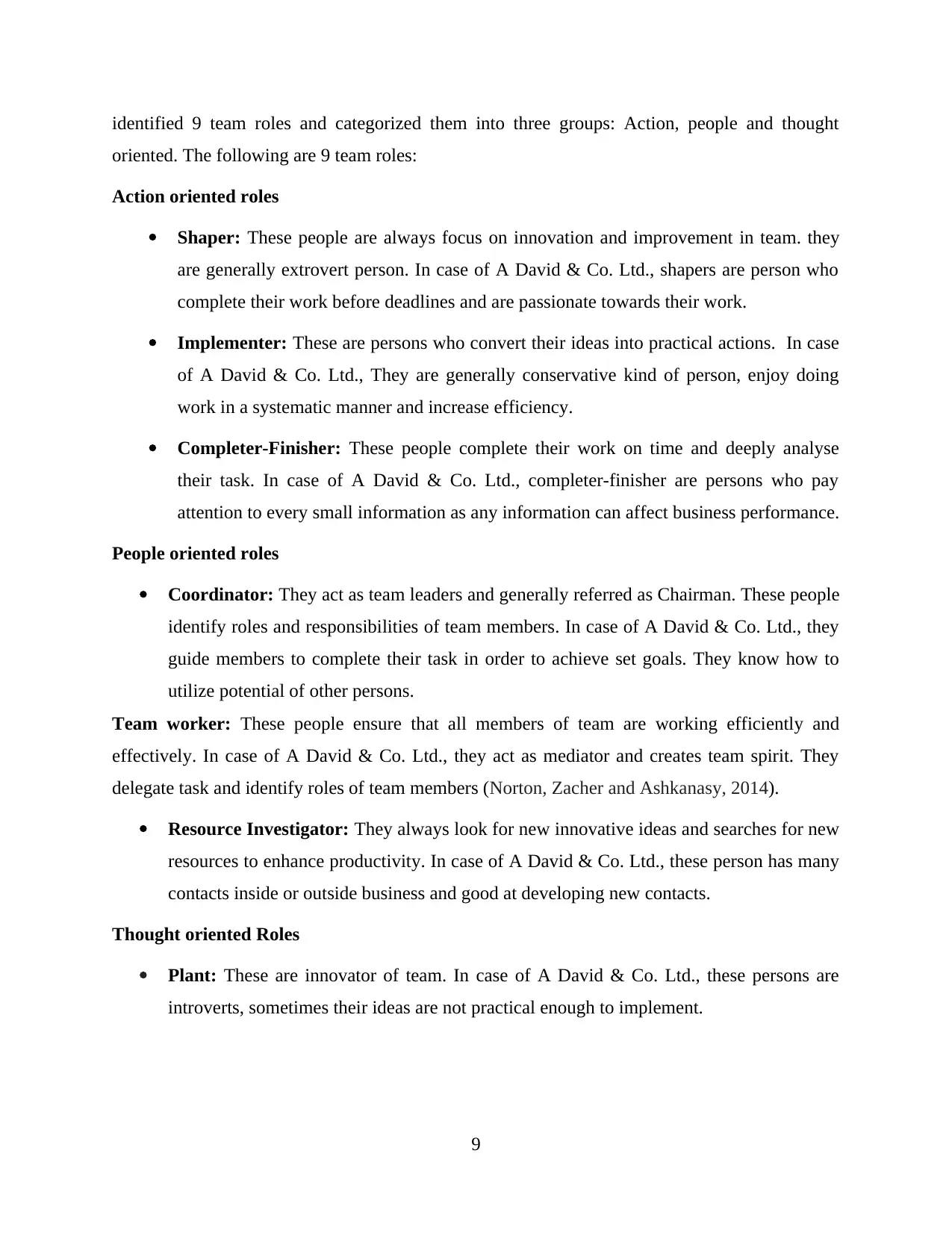
identified 9 team roles and categorized them into three groups: Action, people and thought
oriented. The following are 9 team roles:
Action oriented roles
Shaper: These people are always focus on innovation and improvement in team. they
are generally extrovert person. In case of A David & Co. Ltd., shapers are person who
complete their work before deadlines and are passionate towards their work.
Implementer: These are persons who convert their ideas into practical actions. In case
of A David & Co. Ltd., They are generally conservative kind of person, enjoy doing
work in a systematic manner and increase efficiency.
Completer-Finisher: These people complete their work on time and deeply analyse
their task. In case of A David & Co. Ltd., completer-finisher are persons who pay
attention to every small information as any information can affect business performance.
People oriented roles
Coordinator: They act as team leaders and generally referred as Chairman. These people
identify roles and responsibilities of team members. In case of A David & Co. Ltd., they
guide members to complete their task in order to achieve set goals. They know how to
utilize potential of other persons.
Team worker: These people ensure that all members of team are working efficiently and
effectively. In case of A David & Co. Ltd., they act as mediator and creates team spirit. They
delegate task and identify roles of team members (Norton, Zacher and Ashkanasy, 2014).
Resource Investigator: They always look for new innovative ideas and searches for new
resources to enhance productivity. In case of A David & Co. Ltd., these person has many
contacts inside or outside business and good at developing new contacts.
Thought oriented Roles
Plant: These are innovator of team. In case of A David & Co. Ltd., these persons are
introverts, sometimes their ideas are not practical enough to implement.
9
oriented. The following are 9 team roles:
Action oriented roles
Shaper: These people are always focus on innovation and improvement in team. they
are generally extrovert person. In case of A David & Co. Ltd., shapers are person who
complete their work before deadlines and are passionate towards their work.
Implementer: These are persons who convert their ideas into practical actions. In case
of A David & Co. Ltd., They are generally conservative kind of person, enjoy doing
work in a systematic manner and increase efficiency.
Completer-Finisher: These people complete their work on time and deeply analyse
their task. In case of A David & Co. Ltd., completer-finisher are persons who pay
attention to every small information as any information can affect business performance.
People oriented roles
Coordinator: They act as team leaders and generally referred as Chairman. These people
identify roles and responsibilities of team members. In case of A David & Co. Ltd., they
guide members to complete their task in order to achieve set goals. They know how to
utilize potential of other persons.
Team worker: These people ensure that all members of team are working efficiently and
effectively. In case of A David & Co. Ltd., they act as mediator and creates team spirit. They
delegate task and identify roles of team members (Norton, Zacher and Ashkanasy, 2014).
Resource Investigator: They always look for new innovative ideas and searches for new
resources to enhance productivity. In case of A David & Co. Ltd., these person has many
contacts inside or outside business and good at developing new contacts.
Thought oriented Roles
Plant: These are innovator of team. In case of A David & Co. Ltd., these persons are
introverts, sometimes their ideas are not practical enough to implement.
9
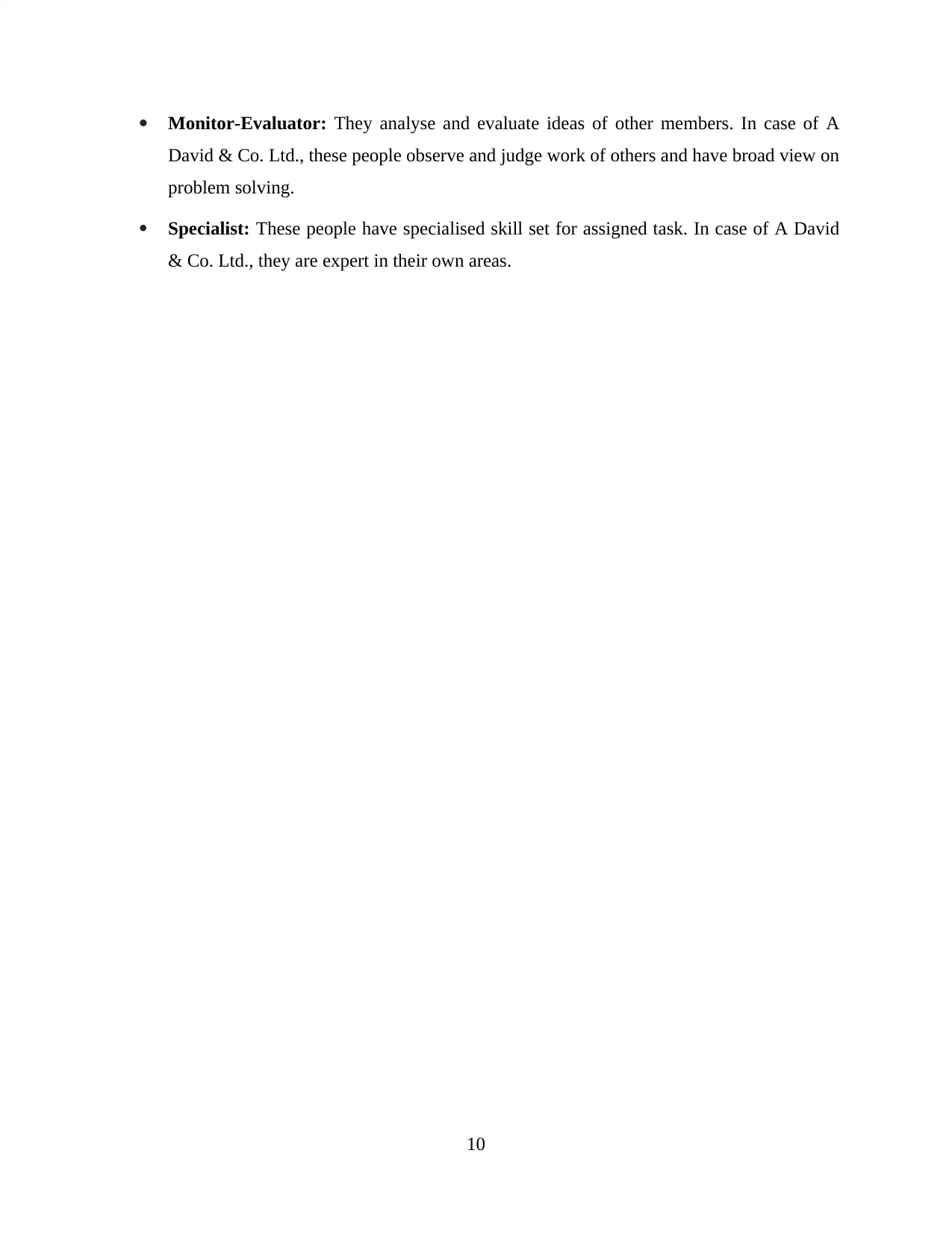
Monitor-Evaluator: They analyse and evaluate ideas of other members. In case of A
David & Co. Ltd., these people observe and judge work of others and have broad view on
problem solving.
Specialist: These people have specialised skill set for assigned task. In case of A David
& Co. Ltd., they are expert in their own areas.
10
David & Co. Ltd., these people observe and judge work of others and have broad view on
problem solving.
Specialist: These people have specialised skill set for assigned task. In case of A David
& Co. Ltd., they are expert in their own areas.
10
⊘ This is a preview!⊘
Do you want full access?
Subscribe today to unlock all pages.

Trusted by 1+ million students worldwide
1 out of 16
Related Documents
Your All-in-One AI-Powered Toolkit for Academic Success.
+13062052269
info@desklib.com
Available 24*7 on WhatsApp / Email
![[object Object]](/_next/static/media/star-bottom.7253800d.svg)
Unlock your academic potential
Copyright © 2020–2026 A2Z Services. All Rights Reserved. Developed and managed by ZUCOL.





